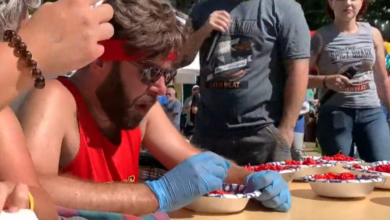Wordle copyright battle: Canuckle not affected

Canuckle, a Canadian word-guessing game inspired by the mega-popular Wordle, says it hasn’t been told to take down its game after some developers recently received notices for alleged copyright violations.
The New York Times filed several Digital Millennium Copyright Act (DMCA) takedown notices to developers of Wordle-inspired games, saying many of the alleged clones infringe on its copyright protections.
It cited infringement on the Times’ ownership of the Wordle name and its look and feel, such as the layout and colour scheme of green, grey and yellow tiles. If affected users decide to fight the notices, there is potential for litigation.
“We haven’t received any notice, any DMCA reference or any takedown notice from New York Times,” Canuckle co-founder Mark Rogers said in a video interview with CTVNews.ca on Wednesday. “After reading … the types of sites and games they’re targeting and looking for, I don’t feel like Canuckle falls into the same category.”
Rogers launched Canuckle with his brother Jeff in February 2022 after the Wordle craze exploded. The IT specialists from Ottawa initially created the Canadian word game based on the public version of the code for Wordle before the New York Times purchased the viral game. He said they initially thought it would only run until Canada Day.
“We initially didn’t think it was going to take off and become as popular as it did,” Rogers said. “We both have full-time jobs and this is something that we do on our spare time because we love promoting Canada and we love all things Canadiana and trivia.”
The game had nearly 300,000 daily users at its peak in the spring of 2022, Rogers said. “It definitely had a lot of traction because that was still sort of during the pandemic and people were still sharing a lot of things online.”
It relaunched with a completely new design, new platform and new codebase in October of that year. Canuckle now has between 50,000 and 55,000 daily users, Rogers said.
‘We’re proud of it’
With Canuckle, players guess words with a Canadian theme and learn facts about Canada after they solve the daily puzzles.
“Certainly no doubt that we were inspired by Wordle and it is a Canadian spinoff version of a daily word game,” Rogers added.
He said Canuckle doesn’t use the Wordle name or trademark, has a different colour scheme using red to highlight that it’s a Canadian spinoff, and is redesigned from the ground up using its own codebase.
“We’ve also added different features and things like a Canadian fun fact that comes up after you solve the daily puzzle to bring a piece of Canadiana trivia to the game as well,” Rogers said. “So I think it really differentiates us and makes Canuckle unique. … I guess we would say we own it and we’re proud of it.”
Hundreds of copycats
Created by software engineer Josh Wardle and made public in 2021, Wordle inspired hundreds of copycats since it became a hit less than three years ago. The New York Times purchased the daily puzzle game from Wardle for a reported seven figures in 2022.
Jordan Cohen, spokesperson for the New York Times, said in an emailed statement to CTVNews.ca that the company has no problem with people creating similar word games that do not infringe its Wordle “trademarks or copyrighted gameplay.”
To defend its intellectual property rights, it says it took action against one user on software developer platform GitHub for creating a “Wordle clone” project, as well as others who shared his code.
The project instructed people how to create a “knock-off version of The Times’s Wordle game featuring many of the same copyrighted elements,” Cohen said.
“As a result, hundreds of websites began popping up with knock-off ‘Wordle’ games that used The Times’ ‘Wordle’ trademark and copyrighted gameplay without authorization or permission,” Cohen said in the statement.
He said GitHub gave the user a chance to change the code and remove Wordle references, but he declined.
With files from The Associated Press




